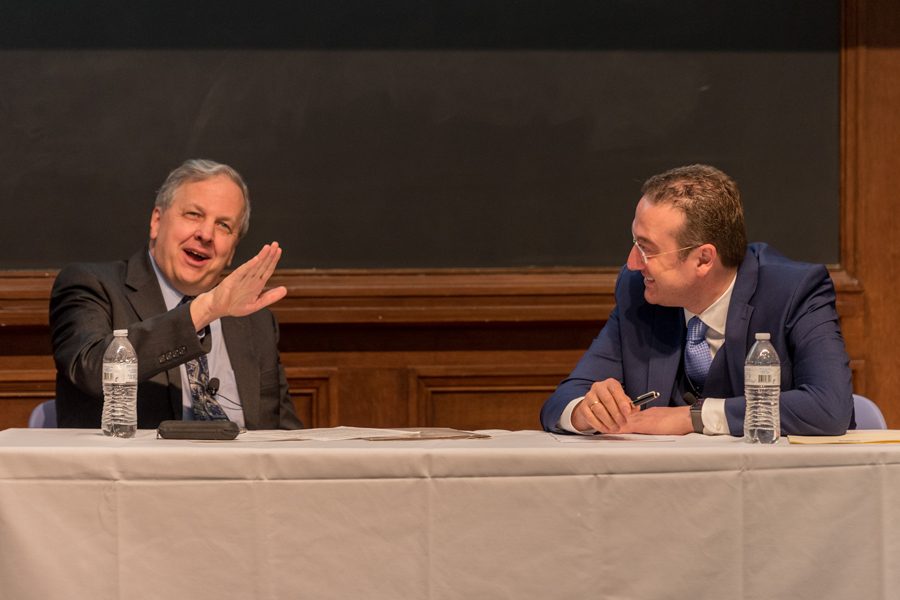Ambassador talks Russian-Georgian relations, effort to join NATO
David Lee/The Daily Northwestern
International studies Prof. Ian Kelly (left) discusses Russian-Georgian relations with Georgian Ambassador David Bakradze. The two spoke in Harris Hall on Monday.
May 15, 2018
David Bakradze, the Georgian ambassador to the United States, discussed Georgian-Russian relations and Georgia’s efforts to join NATO and the European Union at a Monday event in Harris Hall.
Bakradze spoke to about 80 students and administrators on a panel alongside Ian Kelly, a former U.S. ambassador and current international studies lecturer. The event, which was the 2018 Barry Farrell Lecture, was co-sponsored by the political science department and Slavic department. U.S. Sen. Amy Klobuchar (D-Minn.) sent a video lecture to participate in the event, and political science Prof. Jordan Gans-Morse moderated the discussion and the subsequent audience Q&A.
Kelly, who kicked off the event with a lecture about Georgia’s choice to join the “Western community of nations,” said Georgia faces many challenges in its effort to join NATO and the EU. In 2008, Russia invaded autonomous Georgian territories South Ossetia and Abkhazia, violating Georgia’s sovereignty.
“There are two countries in the former Soviet Union that have expressed desire to join NATO and the EU, that’s Georgia and the Ukraine,” Kelly said. “Of course they’ve both suffered invasion, dismemberment and occupation.”
Kelly added that Russia is trying to make it clear to European countries that it sees former Soviet territories as within Russia’s “sphere of interest” and that if Georgia joins NATO, then it is crossing a line and there may be “dire consequences.”
Following Kelly’s lecture, Bakradze spoke about Georgia’s challenges and successes since the Russian invasion in 2008. Bakradze emphasized the role of internal reform in fighting for Georgia’s entrance into NATO and the EU.
“We believe that the reform that we do is something that changes the country at the core,” Bakradze said. “This is something that we believe our future should be.”
This year marks the 100th anniversary of Georgia’s 1918 independence from Russia, Bakradze added.
Klobuchar closed out the lecture portion of the event with a video addressing U.S. relations with Georgia. In the video, she said it is important to increase funding for foreign assistance programs that help countries like Georgia.
“First we need to support Georgia’s economy, because we know that when economies are strong, democracies are strong,” Klobuchar said. “When democracies are strong, the Kremlin’s power diminishes.”
Like Bakradze, Klobuchar commented on the anniversary of Georgia’s independence and commended Georgia in its quest for democracy. She also stressed that the U.S. should continue to support Georgia’s “hard-fought and hard-won” independence.
Bakradze said he was inspired when he first came to the U.S as a 14-year-old exchange student, having known nothing about the U.S. besides the movies that survived Soviet censorship.
“Look how this country that has become a land of opportunity,” Bakradze said. “The U.S. has become a leader in democratic developments and has inspired many other countries.”
Weinberg sophomore Claudia Sierra, who attended the event, said she took a class about politics in Russia last quarter, which led her to take interest in Monday’s lectures.
“People don’t really understand the extent to which the Soviet collapse still affects us today,” Sierra said. “I came here because I’m a (political science) major and ambassadors are like celebrities to me, but this is an important topic to talk about.”
Email: elizabethbyrne2020@u.northwestern.edu
Twitter: @lizbyrne33



